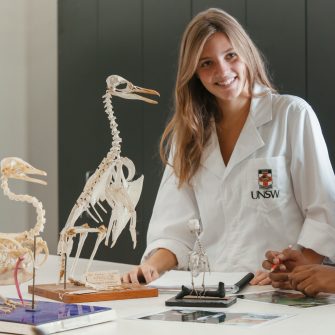Bachelor of Science / Bachelor of Social Sciences
- Commencing Terms
- Term 1, 2 & 3
- Duration
- 4 Year(s)
- Delivery Mode
- Face-to-face (includes blended)
- Campus
-
Kensington
- Codes
- UAC code 429210
- Program code 3923
-
2025 Indicative first year full fee
- $12,500*
-
2025 Indicative full fee to complete degree
- $54,500*
-
2025 Indicative first year full fee
- $56,500*
-
2025 Indicative full fee to complete degree
- $248,000*


UNSW Arts, Design and Architecture Info Evening
Wed 7 May, 6 - 7 PM AEDT | Online
Hone in on your creativity skills and discover what you can achieve as a UNSW Arts, Design & Architecture student. Find out how we can equip your passions and creativity with the practical skills and knowledge to succeed. You'll learn about our degrees, career opportunities, admission pathways, scholarships and more.
- Overview
- Entry requirements
- What will I study?
- Future careers
- How to apply
- Fees & Scholarships
Overview
Find your place at UNSW and join the forefront of scientific discovery and social progress. This globally recognised double degree offers a broad and flexible education that you can tailor to your passions and career goals.
In the Bachelor of Science, you’ll gain in-demand transferable skills you can apply to almost any industry. A science degree unlocks a world of stimulating career possibilities from earth science to psychology, mathematics to biotech.
In your Bachelor of Social Sciences degree, you’ll explore a broad range of political, international, social, environmental and economic challenges that make real-world impact. You’ll gain the powerful knowledge and skills to inform public debate and shape societal policies.
With sought-after expertise across two disciplines, this double degree will expand your skill set and multiply your career possibilities.
Key features
Build a degree around your passions and aspirations
This double degree gives you the flexibility and variety to explore a range of study areas to find a career-enhancing path that’s right for you. In the Bachelor of Science, you’ll choose from 27 majors across the physical, natural and human sciences. In the Bachelor of Social Sciences, you can choose from 13 specialisations such as business, policy, environment, sociology, media and international studies.
Be empowered to lead your learning with SciConnect
SciConnect is an innovative online system that's integrated across your whole science degree. It will be there to help you settle into university, track your professional development and showcase your skills to future employers. The platform focuses on connecting you with four key areas to help you get the most out of your student experience including orientation, co-curricular opportunities and communities, career development and a graduate portfolio.
SciConnect enables you to shape your university experience and supports you in showcasing your talents to potential employers with a comprehensive impression of who you are, beyond your academic transcript.
Gain vital practical experience, here and overseas
Choose from various internship opportunities (including the SCIF3199 Science Work Placement course and the POLS5100 International Relations Internship) and exciting international exchange opportunities with our industry partners. Through real-world work experiences, you'll gain vital skills in communication, analysis, ethical decision-making and teamwork to bolster your career.
Double your employability and multiply your opportunities
Combine your interests and gain a competitive advantage in the graduate job market with this globally recognised double degree. By approaching your studies with the added perspective of a second discipline, you’ll develop a richer understanding of your subject matter and graduate with a specialised skill set that will set you apart.
Despite the name, a double degree doesn’t mean double the time or workload. By combining the Bachelor of Science and Bachelor of Social Sciences into a double degree, you’ll study focused courses in each program, allowing you to complete the two degrees faster.
Explore your career possibilities through research and work integrated learning
Take advantage of our Work Integrated Learning (WIL) and Research Integrated Learning (RIL) opportunities to explore potential career paths. These experiences allow you to apply your skills in a professional context and learn alongside world-leading academics.
Why study this degree at UNSW?
Want to see more from UNSW Science?
Entry requirements
Assumed knowledge
Mathematics Advanced or Mathematics Extension 1 (depending on chosen area of study) plus one or more of Biology, Chemistry, Earth and Environmental Science, Physics
Adjustment Factors
We offer a range of adjustment factor schemes that reward students for academic performance and extra-curricular achievements. These schemes also take into account a range of personal and educational disadvantages that may have affected your studies.
HSC Plus
This scheme rewards students who perform well in Year 12 subjects that are relevant to their preferred UNSW degree. You may be awarded up to five points.
Elite Athletes, Performers and Leaders (EAPL)
This program recognises achievements in the areas of sport, academia, leadership and music at an elite level. You may be eligible for up to five points.
Educational Access Scheme (EAS), opens in a new window
Factors such as illness, financial hardship, language difficulties or attending a particular school can mean you don't always get the best possible marks in Years 11 and 12. If one of these situations applies to you, submit an application for the Educational Access Scheme (EAS) via UAC. Eligible students can receive between 1 and 10 points towards their chosen UNSW degree.
Admission pathways
Your ATAR is not the only measure of your potential to succeed, which is why we offer a range of pathways into university. Explore your options below and get in touch with our Future Student Advisers to discuss your path to UNSW.
Gateway Admission Pathway
This scheme is open to students who attend Gateway schools, live in a low-socioeconomic area based on IRSAD and IEO indexes of SEIFA criteria, or are an Aboriginal and Torres Strait Islander person. It adjusts the ATAR requirements for your preferred UNSW degree and provides early offers and early conditional offers to UNSW.
Entry programs for Australian Aboriginal and Torres Strait Islander people
We offer entry programs for Indigenous Australians, including the Indigenous Preparatory Programs and the Indigenous Admission Scheme (IAS). The entry pathway program you apply for will depend on the degree you want to study.
English language requirements
You may be asked to provide evidence of your English proficiency to study at UNSW depending on your educational background and citizenship. English language skills are vitally important for coping with lectures, tutorials, assignments and examinations - this is why UNSW requires a minimum English language competency for enrolment.
If you’re completing an Australian Year 12 qualification (e.g. NSW HSC or equivalent), you do not need to provide anything extra to prove your proficiency. Your qualification will be used as evidence of your English proficiency.
If you do need to provide evidence of your English proficiency, this will be indicated in your application. You can prove this by providing evidence that you meet one or more of the following criteria:
- English language tests and university English courses
- Prior study in the medium of English
- Other qualifications
If you need to improve your English skills before you start your degree, UNSW College’s Academic English Programs are for you. The programs are suitable for various English levels and help you prepare for university studies and life in Australia.
For more details, visit the English Language Requirements page.
International direct entry
We do not accept secondary qualifications from this country. We may accept tertiary study results, please contact us for more information.
Please contact us for direct entry requirements.
Admission pathways
If you do not meet the requirements for direct entry into your chosen degree, you may be eligible for a pathway program with UNSW College. UNSW College provides alternative entry options using university-approved content so that you can start your UNSW journey with confidence.
English language requirements
You may be asked to provide evidence of your English proficiency to study at UNSW depending on whether you are from an English-speaking background or non-English speaking background. English language skills are vitally important for coping with lectures, tutorials, assignments and examinations - this is why UNSW requires a minimum English language competency for enrolment.
If English is not your first language, you’ll need to provide proof of your English proficiency before you can be given an offer to study at UNSW. You can do this by providing evidence that you meet one or more of the following criteria:
- English language tests and university English courses
- Prior study in the medium of English
- Other qualifications
If you need to improve your English skills before you start your degree, UNSW College’s Academic English Programs are for you. The programs are suitable for various English levels and help you prepare for university studies and life in Australia.
For more details, visit the English Language Requirements page.
Check the specific English language requirements for this program
Program structure
The Bachelor of Science/Bachelor of Social Sciences is a double degree that you can complete in four years with full-time study. You’ll complete a minimum of 192 units of credit (UOC) through a combination of core subjects, majors, minors and electives.
Full program structure
Your double degree consists of:
96 units of credit from Science, including:
- Five core courses (orientation, graduate portfolio and three employability experience courses)
- At least one Science major
- An optional minor
- Science elective courses (if required)
96 units of credit from Social Sciences, including:
- One Social Sciences major
- Eight core courses in Social Sciences
Majors
Future careers
This exciting double degree will give you the optimal balance of theoretical and hands-on learning to prepare you for tomorrow’s workforce. You’ll develop transferable skills that you can apply to almost any industry. You’ll gain a strong foundation in logical, analytical and critical thinking, as well as vital skills in teamwork and communication.
Pursuing a career in science could land you roles in research institutes, government agencies, NGOs and private sector organisations working to solve tomorrow’s problems through a science-based approach.
On the social sciences side, you might use your expertise to work as a policy adviser, research consultant, advocate, government or United Nations official – the opportunities are boundless.
Explore our study areas below to discover the range of potential career paths available across the fields of science and social sciences.
Potential careers
A double degree expands your career possibilities as you’ll have expertise across two (or more) fields. Both degrees offer a wide variety of majors and specialisations, which allow you to tailor your education to your career goals.
How to apply
Applications for undergraduate study from domestic students (Australian citizens, Australian permanent residents, Australian permanent humanitarian visa holders and New Zealand citizens) are processed by the Universities Admissions Centre (UAC).
Visit the Apply section of the UAC website, opens in a new window and you can nominate up to five degrees in order of preference, with the first being your most desired degree and university.
On-time applications for admission usually close at the end of September each year for Term 1 admission. Late applications can be submitted, but a late fee will apply. For study starting in Term 1, the majority of offers are made in December and January. Visit the UAC website, opens in a new window for key dates for admission outside of Term 1.
Ready to start your application?
For most international students, applications are submitted via our Apply Online service. We encourage you to submit your completed application as early as possible to ensure it will be processed in time for your preferred term.
Some high-demand programs with limited places, may have an earlier application deadline or may have an earlier commencement date. For more information visit our international applicant information page.
*If you are an international student studying an Australian qualification, go to the Universities Admission Centre (UAC), opens in a new window for application and UAC key dates. Note: If you are under 18 years of age, you need to make special arrangements. Read more.
Ready to start your application?
Fees & Scholarships
Commonwealth Supported Place multiple Student Contribution Bands may apply for this double degree. See single degrees for the applicable fee bands.*The student contribution for a Commonwealth Supported Place is an indication only of the amount payable in Year 1 based on a standard full-time load of 48 credit points (1.0 EFTSL). The actual student contribution you will be liable for depends on your individual program of study and the calendar year in which you enrol. Actual fees are calculated upon enrolment. Student contribution amounts are subject to annual review by the University and may increase each year during your studies (subject to caps determined by the Australian Government), effective at the start of each calendar year. The indicative fees listed here are based on an estimated average and are for tuition only other fees and charges are not included.
*Fees are subject to annual review by the University and may increase annually, with the new fees effective from the start of each calendar year. The indicative fees listed here are based on an estimated average and are for tuition only, other fees and charges are not included. The amount you pay will vary depending on the calendar year to enrol, the courses you select and whether your study load is more or less than 1 Equivalent Full Time Student Load (8 courses per year).
Indicative fees are a guide for comparison only based on current conditions and available data. You should not rely on indicative fees. More information on fees can be found at the UNSW fees website.
Indicative fees to complete the program have been calculated based on a percentage increase for every year of the program. Fee increases are assessed annually and may exceed the indicative figures listed here.
Indicative fees to complete the program include tuition plus an estimate of study-related costs of approximately $1,000 per year. To find out more about other costs, visit UNSW International.
Scholarships
At UNSW, we award over $83 million in scholarships each year. We pride ourselves on rewarding excellence and making university accessible to students from all walks of life. Whether you’re a domestic or international student, our range of scholarships, prizes and awards can support your journey.

QS World University Rankings, 2025

AFR Top100 Future Leaders Awards, 2020-2025

#1 Australian uni attended by start-up founders






